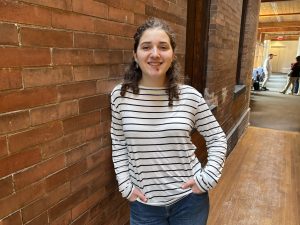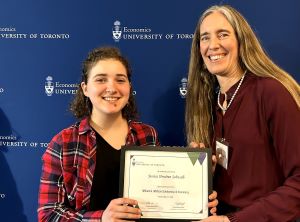
Jessica Hendren Schwalb has already started her career. As she prepares to cross the stage at Convocation Hall, the new Woodsworth College graduand is working with the United Way for Southeastern Michigan. The focus of her work is articulating policies and programs that are helping low-income people achieve economic mobility. It’s a position that her double major in in Economics with a Focus on Data Analytics and Peace, Conflict and Justice Studies has well-prepared her to do.
“My classes have been giving me a good sense of how to speak the language of economics in advocacy work. I remember in ECO202, writing a policy brief and the feeling that it was a tool that gave me a chance to turn the economic conclusions we’d arrived at in class into policy,” she said. “I also took labour economics last year and ended up diving into the minimum wage literature. A lot of people conclude that if you raise the min wage, you have less employment overall, but you also see increased spending power. It’s a good example of how you can have different models that need to be stress tested in the real world.”
Stress testing economic models, evaluating programs using the tools of economics research, collecting, comparing and analyzing the data, are all concepts Jessie has been applying in her work. After working part time with the United Way online throughout the past semester, completing her degree freed Jessie up to take a full-time position.
“Researching policy issues and deciding where we want to put our attention is one of the hardest, but most interesting parts of the work,” she said. “There are so many bills passing all time. There’s also meeting with other organizations as United Way provides grants to those organizations, and we have to monitor the projects we fund. That coalition building and networking helps us to draft material in support or against bills. The job changes throughout the year based on where we are in current cycle of legislative sessions.”

It’s work that defies intellectual rigidity. If policy is to be created and implemented based on evidence, then it needs to be rigorously examined, and assumptions challenged.
“There are a lot of economic concepts I think of in my day-to-day life,” Jessie explained. “I think about opportunity cost, for example, in how I want to spend my time, but I also know the concepts can’t be taken the same way all the time. One of the lessons I learned from Jeffrey Sun in the Environmental Economics course is that free markets work, when we hold key assumptions, but if we don’t have those assumptions, then the free market is not going to give us what we want.”
That ability to apply economic concepts to daily life is a skill Jessie shared with other students through her work as a learning assistant (LA) with the Economics Study Centre (ESC) at the Department of Economics.
“Being an LA was great at reminding me of all the things I learned in my first and second year,” she remembered. “It’s all about helping people work through problems, and through doing that, my economics knowledge got so much better. You do have a set of constraints around what you can do, and how much time you have to help people, so you have to figure out the best way to help as many people as possible. My role at the ESC was to help people learn to help themselves. And it helps me in my policy role now. I help people help themselves by giving them a structure or a framework to work with.”
Return to the Department of Economics website.
Scroll more news.
Learn more about supporting students like Jessie.
